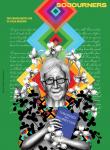IN BONG JOON-HO'S Parasite, being upper class means loving Western culture—and its colonialism.
Spatial metaphor structures the award-winning dark comedy from the Korean director. Families and living spaces are the primary characters and settings for the film. The poor Kim family lives in a cramped basement apartment, and the rich Park family lives high up in the hills of Seoul.
(Warning: Spoilers)
In the first half of the movie, the Kims’ son Ki-woo is hired as an English tutor for the Parks’ daughter, and the Kims scheme to get each member of their family employed by the Parks. Their plot runs smoothly, and the Kims relax at the Parks’ luxurious home while they are away. But the movie’s clean narrative line drops when a third family and their living arrangement are revealed. The former housekeeper returns to expose a subterranean bomb shelter in the Parks’ home where her husband has been living, unbeknownst to the Parks.
The former housekeeper and her husband sit even lower in the class hierarchy than the Kims by living completely below ground. And the Kims’ desire to become wealthy leads them to murder the former housekeeper and trap her husband in the bunker.
Class, however, is not only represented by the families’ living spaces, but also their investment in Western culture. The Parks love America. They praise American goods and encourage their son’s obsession with Native Americans. He runs around in a headdress, shooting toy arrows, and loves a plastic teepee made in America.
This stereotyping and fetishization of Native culture by the young boy and his family represents how closely related the upper-class family’s wealth and colonialism are.
And it’s exactly the Parks’ attraction to the West to which the Kims appeal. Ki-woo and his sister pose as American-educated, and therefore qualified, tutors for the Parks’ children. It is this trust the Parks have in anything from America that sets up the Kim family’s grand deception.
When I traveled to see my family in Indonesia last January, Ariana Grande’s “7 Rings” had just released, and I heard Grande chant, “I want it, I got it,” over and over on the radio as we inched through the crowded streets of Bandung. American consumeristic culture is attractive to many across the globe and educates countries in capitalism and colonialism.
But this attraction doesn’t just go one way. In the U.S., access to “exotic” cultures, like those of East Asia, can be considered desirable. After all, Grande got a kanji tattoo that she thought said “7 Rings.” What it really said? “Small barbecue grill.”

Got something to say about what you're reading? We value your feedback!







